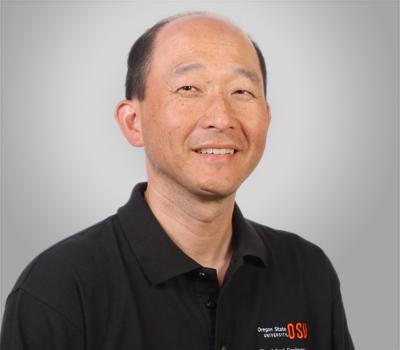
Growing up in Alaska, Un-Ku Moon had some tough summer jobs starting at the age of 16 — from working at a salmon cannery and on a fishing (tender) boat to landscaping he put in 12 to 16 hour days.
He recalls one time that he fell asleep holding a basket of salmon eggs but woke up just before he hit the floor. “I got my arms out in front of me and I was okay other than the huge splatter of salmon eggs everywhere!” he says
He realized though that it was a great way to pay for college.
“I remember talking to friends who were doing this work for similar reasons and saying that when we ‘grow up’ that we would get desk jobs! And I’m certainly thankful for that today,” he says.
Although he was interested in math and physics growing up he was not the kind of kid that built radios or took things apart to see what was inside. But electronics became more interesting to him when at University of Washington he started learning about how it worked. He really got the bug though when he took a class on computer chips — or integrated circuits.
“Cell phones, digital recorders — all the cool stuff we have are because of those chips and I decided I wanted to know what was in those chips — I wanted to dive a little deeper,” he says.
After he got his master’s degree at Cornell University, he began his career with Bell Labs but after just six months realized what he really wanted was to go into academia where he could also teach, and so he went on to get his Ph.D. at University of Illinois at Urbana-Champaign.
Moon currently works at the interface of where the analog world is translated into digital information — chip design for analog to digital converters.
“You can’t live without it, it’s the bottleneck of everything in any communication,” he says. One example is how voice is converted to digital information when you talk on a cell phone, but any instance where information travels through the air (such as Wi-fi) — analog to digital conversion is necessary.
His work to make the chips faster, smaller and more efficient so they use less power goes into everything from smartphones to pace makers. And his outstanding achievements in engineering have earned him Fellow status at the IEEE given to only a select group of members.
He works in collaboration with his research group — which is typically 8 to 15 graduate students. It is the interaction of his team that is one of the most rewarding parts about his job, he says. And his dedication shows — he received the OSU graduate mentoring award in 2007.
“It’s really fun. It’s not exactly like I’m a Jedi master discipling apprentices,” he laughs. “But it’s almost like that in the sense that they rely on me as an advisor and I rely on them as very talented individuals who will go on to do big things.”
Moon appreciates all the outdoor activities available in Corvallis like hiking, biking, and outdoor sports. And with three kids much of his time is spent with his family. Saturdays often mean a full day of soccer since he volunteers as a referee for the youth soccer organization that his kids play for.
As a former soccer player on the all star Alaska team he says sometimes his competitive nature kicks in and he wants to push them to be better soccer players. “But just like with graduate students, you can only push them enough to get them to try harder, and at the same time give them a lot of encouragement,” he says.
—By Rachel Robertson

